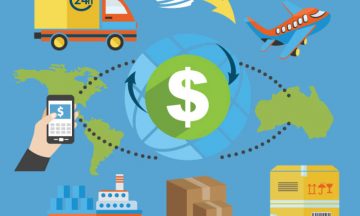Published by Taylor Financial Group
Are the words ‘tariffs,’ ‘trade wars,’ and ‘protectionism’ scaring you lately? These words have created a lot of uncertainty in the markets in the last couple of months, and today is no different. But how do they impact your spending and investments? We recently had the opportunity to hear Dr. David Kelly, Chief Economist at JP Morgan Chase, speak directly on this issue.

The Background on Tariffs
First, let me give you a little background on some of the recent issues with tariffs. One of President Trump’s original campaign promises was that he wanted to end (or re-negotiate) what he believes are unfair trade deals, such as the North American Free Trade Agreement (NAFTA). He believes these deals cost billions of dollars in lost jobs and revenue to Americans. For example, the Economic Policy Institute found that approximately 700,000 jobs had been lost in 2013 because of factory jobs moving from the U.S. to Mexico. In an effort to keeps jobs on this side of the border, Trump began to impose taxes on goods coming into the country. To keep Americans employed, he is set to impose a 25% tariff on steel imports and a 10% tax on aluminum products. In total, Trump is proposing $60 billion of tariffs on Chinese goods that are imported into the U.S.
How Tariffs Could Affect the Consumer
While it may sound appealing to try to protect American jobs from moving out of the country, the downside to the tariffs on countries like China is they will likely retaliate, according to Dr. Kelly. In fact, on March 16th, China was proposing additional tariffs of $3 billion on close to 130 American products as a result of Trump’s actions, including wine and fruit. These tariffs could result in higher consumer prices on everything from your child’s sneakers to the latest iPhone. And indeed, China just announced today that they will impose tariffs on 128 American exported goods in retaliation to US tariffs on steel and aluminum. Higher consumer prices may mean that the average American has less money to save and invest.
How Tariffs Could Affect the Stock Market
But the issues with tariffs go beyond just rising prices at the cash register. The stock market is taking a hit too and according to Goldman Sachs, the biggest concern from investors is “the potential of more protectionist trade measures” by the Trump administration. These tariffs could harm the earnings of corporations that use products where tariffs are imposed and could hurt your portfolio if your holdings include these companies. For example, Ford Motor Company said that profits could take a tail spin in 2018 primarily because of the increased cost of those materials. Even companies that produce tractors, like Caterpillar Inc. and Deere & Company, could see their earnings cut by 6-9% per share. According to Barron’s, though the numbers are small in the context of global trade, there doesn’t appear to be the desire for the mutually assured destruction that might come from a full blown trade war. This is a relief, at least for now.
Despite China’s announcement today, we hope that the action will not match the rhetoric and cooler heads will prevail. The bigger issue, however, is that we have a jittery market in its ninth year of a bull run, so there is a great deal of “headline risk” that we need to get accustomed to. Maintain you long term focus and take advantage of market opportunities. Let us know if you have any questions.
Sources:
JP Morgan Asset Management, Fiscal Stimulus, Monetary Drag and the Investment Outlook, March 2018.
Market Watch, Why Trump’s Trade War Will Hurt More American Jobs Than It Helps, March 2018.
New York Times, Trump’s Trade Threats Put China’s Leader on the Spot, March 2018.
Reuters, The Financial Impact of Trump’s Tariffs on Steel and Aluminum, March 2018.
The views stated in this letter are not necessarily the opinion of Cetera Advisor Networks LLC and should not be construed directly or indirectly as an offer to buy or sell any securities mentioned herein. Due to volatility within the markets mentioned, opinions are subject to change without notice. Information is based on sources believed to be reliable; however, their accuracy or completeness cannot be guaranteed. Past performance does not guarantee future results.
Securities offered through Cetera Advisor Networks LLC, Member FINRA/SIPC. Investment advisory services offered through CWM, LLC, an SEC Registered Investment Advisor. Cetera Advisor Networks LLC is under separate ownership from any other named entity.


